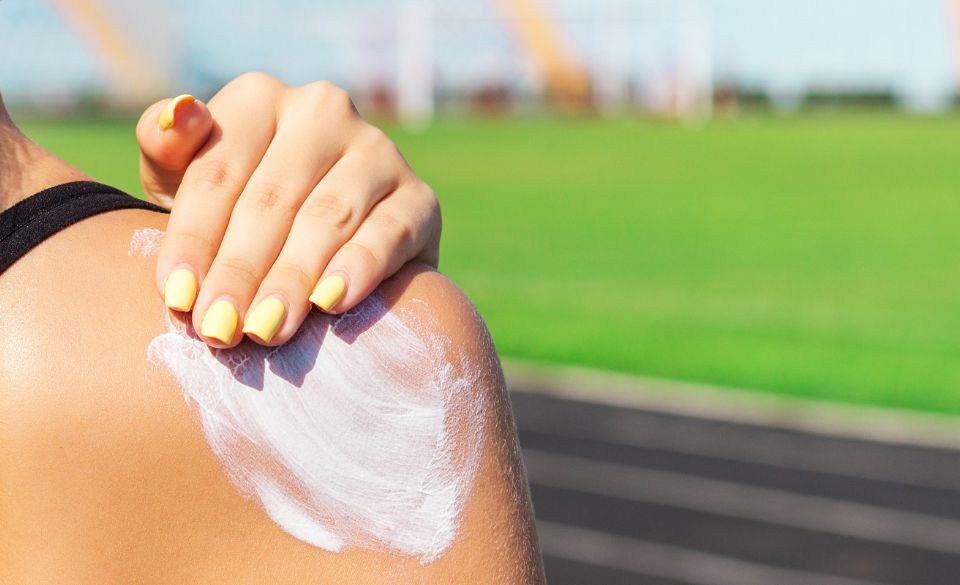
The Importance Of Sunscreen For Runners
Page Contents
- Why Sunscreen is Vital for Runners
- The Necessity of Sunscreen for Runners
- Do Runners Require Specialized Sport Sunscreens?
- Does Sunscreen Cause Cancer?
- Does Wearing Sunscreen Impact Vitamin D Absorption?
- How to Properly Apply Sport Sunscreen
- The Best Sport Sunscreens
- Final Words – The Importance Of Sunscreen For Runners
When it comes to running, the great outdoors offers a vast playground for runners to explore. Whether it’s the invigorating morning breeze, the scenic trails, or simply the freedom of the open road, outdoor running comes with a plethora of advantages, from improved mental well-being to enhanced vitamin D levels. However, amidst these benefits lies a significant risk – the potential for skin cancer. As runners, we often prioritize our gear, training routines, and nutrition, but one crucial element that should never be overlooked is sunscreen.
In this comprehensive guide, we delve into the critical role of sunscreen in the lives of runners. We’ll explore the necessity of sunscreen, the myths and facts surrounding its use, and even provide recommendations for some of the best sport sunscreens available. So lace up your running shoes and join us as we uncover why sunscreen is an indispensable part of every runner’s arsenal.
Why Sunscreen is Vital for Runners
The majority of runners conduct a significant portion of their training in outdoor settings, which offers numerous advantages, such as enhanced mental well-being and increased vitamin D levels. However, outdoor running also carries a substantial risk – the potential for skin cancer. Due to this risk, the importance of sunscreen for runners cannot be overstated; it is as indispensable as a quality pair of running shoes or other essential gear.
The Necessity of Sunscreen for Runners
A review published in Sports Medicine in 2022 highlighted potential health issues associated with ultra-distance running, including the risk of skin cancer. Previous research had indicated that ultra-endurance runners faced a heightened risk of both pre-malignant and malignant skin cancers. This increased risk resulted from a combination of immune suppression caused by prolonged exercise and prolonged exposure to ultraviolet (UV) radiation, which elevated their susceptibility to skin cancer compared to other populations.
The authors of the study also observed that only 62% of ultra-endurance athletes reported using sunscreen. While these statistics may differ for road runners, who are still exposed to UV radiation during their runs, a 2020 review in Sports Medicine noted that all outdoor athletes, including road runners, experienced a higher incidence of sunburn, consequently increasing their risk of skin cancer.
In addition to the threat of skin cancer, chronic UV exposure and sunburns can lead to skin damage and premature aging. Sunscreen provides protection against such damage and can aid in preventing premature aging.
Effective measures to guard against sunburn and UV exposure encompass the use of UV-blocking clothing, sunscreen, and sunglasses. Relying solely on a hat and sunglasses is not sufficient; for comprehensive sun protection, sunscreen is essential to shield against ultraviolet rays.
Do Runners Require Specialized Sport Sunscreens?
While any sunscreen is better than none, sport sunscreen is better suited to meet the specific sun protection needs of athletes during exercise.
What sets sport sunscreen apart? Typically, sport sunscreens are water-resistant. Runners sweat, and perspiration can cause sunscreen to wear off. Opting for a water-resistant sunscreen ensures it will remain effective even as you sweat.
Does Sunscreen Cause Cancer?
You may have encountered social media posts and videos claiming that sunscreen causes cancer and advising against its use. Like many claims on social media, this fear-inducing assertion is based on a flawed interpretation of scientific information.
The concern regarding carcinogenic substances in sunscreen primarily centers around benzene. However, only one study has supported this claim, and it has yet to be confirmed. The University of Nebraska – Lincoln Medical Center highlights our incomplete understanding of the extent to which benzene is absorbed through the skin. As noted by the University of Colorado Cancer Center, even if there is a small risk associated with benzene, it would still be lower than the risk of developing skin cancer due to UV exposure.
Furthermore, there are mineral sunscreens available that do not contain benzene (such as the recommended sunscreens below). Mineral-based sunscreens are benzene-free and thus a safer option for those concerned about potentially carcinogenic ingredients.
Does Wearing Sunscreen Impact Vitamin D Absorption?
You may have heard claims that sunscreen inhibits the absorption of vitamin D, but is this assertion accurate or a misconception?
To provide some context, vitamin D is a micronutrient essential for bone health, immune function, metabolism (particularly insulin secretion), cardiovascular function, and athletic performance. Runners can be at risk of vitamin D deficiency, which can lead to stress fractures, illnesses that disrupt training, and suboptimal athletic performance, according to a 2020 review in Nutrients.
While some vitamin D is obtained through dietary sources, a significant portion is synthesized in the body through sun exposure. Concerns arise because sunscreen blocks UV rays, leading some to believe it could hinder vitamin D absorption.
However, a 2019 review in the British Journal of Dermatology concluded that sunscreen use does not interfere with vitamin D absorption. In fact, experts recommended using sunscreen and other UV-blocking measures (such as hats and sunglasses) during outdoor activities. Just 5-15 minutes of sun exposure can provide sufficient vitamin D, and most runners spend much longer periods outdoors. Therefore, using sunscreen during your runs and limiting sun exposure without sunscreen at other times of the day is a prudent approach.
How to Properly Apply Sport Sunscreen
Using sunscreen correctly is essential to ensure adequate protection from the sun’s harmful rays.
1. Choose the Right SPF: Make sure you select a sunscreen with a sufficiently high SPF (Sun Protection Factor). The American College of Dermatology recommends a minimum of SPF 30, but you may opt for higher SPF for added protection.
2. Opt for Broad Spectrum Protection: Ensure your sunscreen offers broad spectrum protection. This means it guards against both UVA and UVB rays, providing comprehensive coverage.
3. Follow Application Instructions: Apply sunscreen in accordance with the manufacturer’s instructions. Most sunscreens advise applying it 15-30 minutes before engaging in outdoor activities, including exercise. Additionally, reapplication is typically recommended after 80-90 minutes of physical activity. This means you may need to reapply sunscreen during extended runs or outdoor workouts.
4. Consistent Use: For optimal effectiveness, make sunscreen a daily habit. Apply it before each run, except when running in complete darkness or during nighttime hours.
The Best Sport Sunscreens
Neutrogena Sport Face Sunscreen SPF 70: This sunscreen is specifically designed for active individuals. It offers high SPF protection, is sweat-resistant, and won’t clog pores. It’s suitable for both face and body.
Coppertone Sport Sunscreen Lotion SPF 50: Coppertone’s sport sunscreen provides broad-spectrum protection and is water-resistant for up to 80 minutes. It’s a durable option for outdoor activities.
Banana Boat Sport Sunscreen Lotion SPF 50: Banana Boat’s sport sunscreen is known for its long-lasting protection against UVA and UVB rays. It’s water-resistant and won’t run into your eyes, making it ideal for sports and outdoor workouts.
EltaMD UV Sport Broad-Spectrum SPF 50: EltaMD is a dermatologist-recommended brand known for its high-quality sunscreens. This sport-specific option is water-resistant and provides excellent broad-spectrum protection. It’s suitable for sensitive skin.
La Roche-Posay Anthelios Melt-in Milk Sunscreen SPF 60: La Roche-Posay’s sunscreen is praised for its lightweight, non-greasy texture. It offers advanced protection against both UVA and UVB rays and is water-resistant for up to 80 minutes.
Blue Lizard Australian Sport Sunscreen SPF 30+: Blue Lizard’s sport sunscreen is a mineral-based option that is gentle on sensitive skin. It’s water-resistant and offers broad-spectrum protection. The unique packaging also changes color when exposed to UV light, serving as a reminder to apply sunscreen.
Badger Sport Sunscreen SPF 35: Badger’s sport sunscreen is a natural and organic choice. It’s water-resistant and provides broad-spectrum protection using zinc oxide as the active ingredient. It’s reef-friendly and suitable for eco-conscious individuals.
Supergoop! PLAY Everyday Lotion SPF 50: Supergoop! offers a lightweight, fast-absorbing sport sunscreen that’s suitable for everyday use. It’s water-resistant and provides excellent protection against UVA and UVB rays.
For more detailed information, product reviews, and purchasing options, you can visit the websites of major retailers like Amazon, Ulta, Sephora, or the official websites of these sunscreen brands. Additionally, consult with a dermatologist to find the best sunscreen for your specific skin type and needs.
Final Words – The Importance Of Sunscreen For Runners
In conclusion, the importance of sunscreen for runners cannot be overstated. Outdoor training offers numerous benefits, but it also exposes runners to the risk of skin cancer and premature aging due to prolonged UV exposure. Sunscreen is as crucial as proper running gear, and it should be a part of every runner’s routine.
Recent research has highlighted the elevated risk of skin cancer among ultra-endurance runners, emphasizing the need for sun protection. While some concerns about potentially carcinogenic ingredients in sunscreen exist, they are largely unsubstantiated, and the benefits of protecting your skin from the sun’s harmful rays far outweigh any potential risks.
Moreover, sunscreen does not hinder vitamin D absorption significantly, as demonstrated by scientific studies. It’s important for runners to prioritize both sun protection and vitamin D levels.
To effectively use sunscreen during outdoor activities, follow these key steps: choose a sunscreen with a high SPF, opt for broad-spectrum protection, apply and reapply according to the instructions, and make sunscreen application a consistent habit before each run.
Finally, there are excellent sport-specific sunscreens available that offer water-resistant protection, making them ideal for active individuals. The recommended sport sunscreens listed earlier provide reliable options for runners, ensuring they can enjoy their outdoor training while safeguarding their skin.
For more information and to explore specific products, you can visit reputable retailers or the official websites of the sunscreen brands. Don’t forget to consult with a dermatologist for personalized advice on sun protection and skincare tailored to your unique needs. Protecting your skin is an essential part of maintaining your overall health and well-being as a runner.



